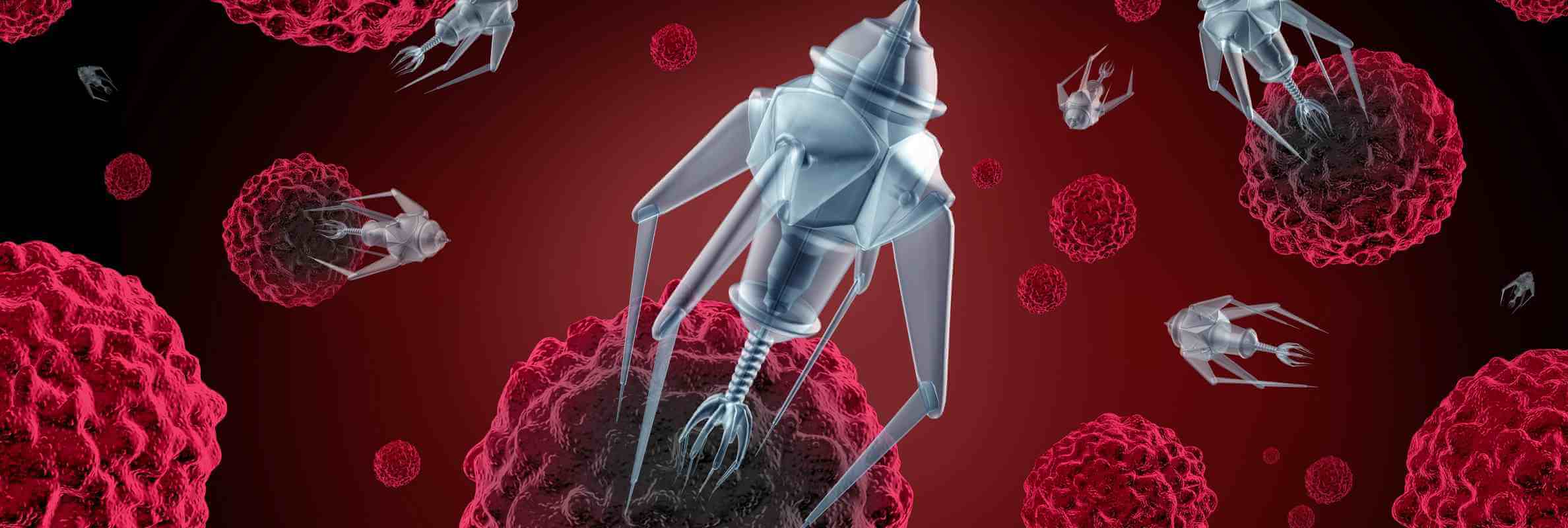Nanoparticles have unique optical, magnetic, and electrical properties. Cancer scientists successfully use these properties to affect cancer cells, the tumor microenvironment, and antitumor immunity. Nanoparticles help doctors overcome the toxicity of chemotherapy, provide targeted delivery of anticancer drugs to the tumor and improve their bioavailability, and destroy the tumor with a magnetic field that is harmless to healthy tissues. The integration of nanotechnologies into cancer treatment is the way to more effective and side-effect-free chemotherapy, targeted therapy, and immunotherapy, as well as the development of fundamentally new methods of cancer treatment.
Content
- Multifunctional magnetic nanoparticles
- Antitumor nanocomplexes
- Nanocapsules for targeted delivery of anticancer drugs
- Thermotherapy with magnetic nanoparticles
- Treatment using nanotechnology abroad
Multifunctional magnetic nanoparticles
Since 2021, a team of researchers at the University Hospital Jena has been working on the creation of multifunctional magnetic nanoparticles for the diagnosis and treatment of cancer.
Due to their unique properties, such nanoparticles find malignant cells in any part of the body and accumulate in them. Depending on the type of nanoparticles, this helps oncologists in the following ways:
- Imaging: accurate detection of the tumor, affected lymph nodes, and even microscopic metastases in any organs and tissues.
- Potentiation of the effect of chemotherapy drugs: nanoparticles generate induction thermal energy, which facilitates the penetration of chemotherapy drugs from blood vessels into tissues and enhances the effectiveness of chemotherapy.
- Precise drug delivery: modified nanoparticles serve as drug carriers, delivering medication in high concentrations to tumor foci.
This method was clinically tested at large hospitals in 5 European countries. The scientists started by testing the protocol in animal models and in cell cultures. The first diseases studied were breast cancer and pancreatogenic tumors. After obtaining excellent preclinical results, the team of researchers at the University Hospital Jena moved on to adapting the effect of nanoparticles to the physiological characteristics of the human body and achieved some success in this. Now clinical trials are ongoing, and we are waiting for confirmation of the possibility of using multifunctional magnetic nanoparticles in practical oncology.
Antitumor nanocomplexes
Similar studies were carried out in the Section for Experimental Oncology and Nanomedicine (SEON) of the Department of Otolaryngology at the University Hospital Erlangen under the direction of Prof. Dr. med. Christoph Alexiou. An antitumor nanocomplex with magnetic memory for targeted delivery and targeted release of chemotherapy drugs was created.
The interdisciplinary team at the University Hospital Erlangen has been developing and standardizing medical nanoparticles for several years. Scientists determine their optimal size and shape, chemical composition, outer coating, ability to penetrate cells and affect their metabolism, and toxicological properties. The first important result of the work was the creation of superparamagnetic iron oxide nanoparticles (SPION). SPION is a base molecule that can be combined with chemotherapy drugs or used in diagnostic imaging of tumors and metastases.
"Due to their miniature size, metal nanoparticles penetrate into malignant cells, damaging their DNA, RNA, and other important intracellular structures. Additional damage to cancer cells is caused by the second component of the antitumor nanocomplex, that is, a chemotherapy drug."
Certain chemotherapy drugs were bound to iron oxide nanoparticles in clinical studies. After the administration of such a complex into the systemic circulation, the area of the tumor and metastases was exposed to an external magnetic field, which attracted the nanoparticles and created a high local concentration of the chemotherapeutic agent. At the same time, the researchers used a magnetic field that is absolutely safe for humans, which does not affect the function of healthy tissues and organs.
Nanocapsules for targeted delivery of anticancer drugs
In 2013, Patrick Couvreur and co-authors were the winners of the European Inventor Award for the development of nanocapsules for the targeted delivery of anticancer drugs. Prof. Couvreur specializes in medical nanotechnologies, in particular their application to cancer treatment.
At the stage of preparation, the chemotherapy drug molecules are placed inside miniature capsules, with the size of the capsule being 70 times smaller than the size of an erythrocyte. Nanocapsules do not allow the chemotherapy drug to begin to act until it is in the target zone, that is, in the area of the primary tumor or its metastases.
The use of nanocapsules makes systemic chemotherapy safer because, even when in the blood vessels at a high dosage, the chemotherapy drug does not affect healthy tissues and organs. In the target zone, the biodegradation of nanocapsules and the release of anticancer drugs occur. Prior to this, the drugs are not affected by the action of enzymes and are excreted by the kidneys / liver, which makes them last longer.
Below are the benefits of using nanocapsules in systemic chemotherapy:
- Safety and excellent tolerance of the course of treatment
- Shorter duration of treatment by reducing recovery periods between courses
- The ability to use higher dosages of drugs and use combined regimens
- Enhanced effectiveness of chemotherapy up to 10 times compared to standard schemes
Another potential advantage of nanocapsule anticancer therapy is the more precise targeting of metastases. For example, due to their small size, nanocapsules freely penetrate into the lymph nodes affected by the oncological process.
Thermotherapy with magnetic nanoparticles
The damaging effect of high temperatures on cancer cells was identified in 1972. Since then, this principle has been used in comprehensive cancer treatment, i.e., general and regional hyperthermia. With the development of complementary and alternative medicine (CAM), hyperthermia has moved to a new level. Now doctors are conducting thermotherapy with magnetic nanoparticles through the direct injection of magnetic nanoparticles into the tumor and their subsequent heating in an alternating magnetic field.
The procedure is suitable for tumors of any localization, ranging from neoplasms of the extremities to metastases in the spine and brain. A solution with magnetic nanoparticles is administered under ultrasound guidance. When performing interventions on the brain, neuronavigation is used. The amount of the drug is calculated individually, taking into account the volume of the tumor mass. After that, patients undergo 1-3 treatments per week to activate the nanoparticles.
After the completion of a course of treatment, you can count on one of the following results:
- Destruction of cancer cells with prolonged exposure to temperatures above 42°С
- Increased sensitivity of the tumor to chemotherapy and radiation therapy when exposed to a temperature of about 40°С
Thermotherapy with magnetic nanoparticles is well tolerated: it has no restrictions on the number of courses, there is no need to take long breaks between procedures, resistance does not develop to it, and it can be combined with other types of treatment. Moreover, thermotherapy with magnetic nanoparticles prevents cancer cells from recovering after irradiation and reduces tumor resistance to chemotherapy drugs.
Treatment using nanotechnology abroad
Nanotechnology is a new stage in cancer treatment that is being actively studied in clinical trials but is not yet included in standard clinical protocols. You can take advantage of this method at foreign hospitals and research centers.
Booking Health, a specialized medical tourism provider that has been helping people with cancer for over 15 years, can help you plan your trip for cancer treatment abroad. With the Booking Health team, you will:
- Find the most suitable hospital and get acquainted with detailed information about it
- Get a remote consultation from your future attending physician
- See the preliminary comprehensive treatment program
- Make an appointment without a long waiting period
- Receive treatment at prices "for residents of the country", which means that you will not pay additional taxes for foreigners
- Communicate with your doctor and hospital staff through a personal interpreter while at the hospital
- Receive recommendations in your native language after discharge from the hospital, and for another 3 months, you will be able to contact your doctor for follow-up
- Get a detailed report on invoices for medical services
The Booking Health medical team will answer your questions about treatment in detail, and the Booking Health managers will take care of your flight, accommodation, and all organizational issues.
Choose treatment abroad and you will for sure get the best results!
Authors:
The article was edited by medical experts, board certified doctors Dr. Nadezhda Ivanisova and Dr. Vadim Zhiliuk. For the treatment of the conditions referred to in the article, you must consult a doctor; the information in the article is not intended for self-medication!
Sources:
Journal of Hematology & Oncology
Read:
Why Booking Health - questions and answers
How to make right decision when choosing the clinic and specialist
7 reasons to trust to the rating of clinics on the Booking Health portal
Don't know where to start?
Contact Booking Health






